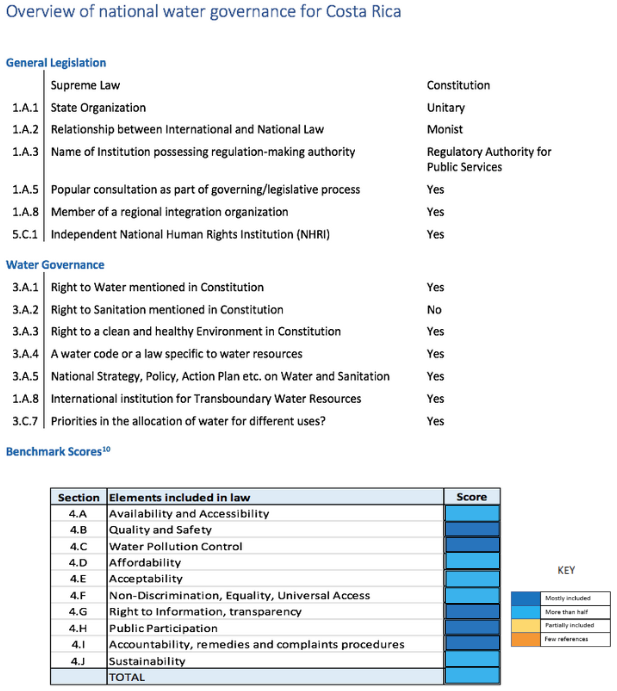“Every person has the basic and undeniable human right of access to drinking water as a good that is essential for life… its use, protection, sustainability, conservation, and management will be governed by the provisions of the law”. The right to water and a healthy environment are established as human rights in the Constitution of Costa Rica. While the right to sanitation is not explicitly stated, overall, the country has scored well on our country’s legal assessment. Costa Rica has invested in ensuring the quality and safety of water and the environment by establishing accountability mechanisms and complaint procedures that guarantee the responsible use of water resources and maintain public transparency. Please download the full report here.
Costa Rica is a unitary presidential constitutional republic. The country is divided into 7 provinces, divided into 81 cantons and then divided again into 470 districts. Each canton charges a municipality with local government initiatives and decisions. The power to ratify treaties is held jointly by the president and the appropriate cabinet minister. Furthermore, the country enables participation, with public consultation as the main tool for the public to express their opinion. It is supported by an online platform as part of an open government initiative, and municipalities offer local initiatives such as plebiscites, referendums, town halls, and public hearings.

Thanks to the San Juan River (Nicaragua) and the Sixaola River Basin (Panama), the country has several transboundary water resources. The Binational Commission of the Sixaola River Basin has been established to be responsible for the management of the river basin and overseeing its integrated development (environmentally, socially, economically, and politically). Costa Rica has also ratified several international, regional, and Bilateral treaties.
Interestingly, public water sources cannot be removed permanently from state ownership in this country (Article 121.14 of the Constitution). There are four institutions in charge of the responsible management of water resources: the Ministry of Environment and Energy (MINAE), the Ministry of Health (MINSALUD), the Ministry of Agriculture and its department the National Groundwater, Irrigation and Drainage Service (SENARA), and the National Institute of Aqueducts and Sewers (AyA). The Rural Aqueduct Associations (ASADA) are local cooperatives that provide accessible clean drinking water to local communities.
The primary legal framework for the management and use of water resources in Costa Rica is governed by The Water Law. Through the Government of Costa Rica, this grants concessions and regulates individual and corporate use of water resources; it establishes domestic use as a priority in case of water scarcity; and it also regulates water infrastructure in order to protect the resource. The right to the use of water is legally connected to land ownership. In order to use surface water or groundwater, property titles require permits or concessions (suspendable) granted by the MINAE. There are many strategic plans and decrees related to water and the environment.
Laws and regulations that are relevant for the protection and sustainable use of water include:
- The Potable Water Law and its Amendments
- The General Health Law
- The General Environment Law
- The Law Establishing the Costa Rican Institute of Aqueducts and Sewers
- The Regulation on the Quality of Potable Water
- The Regulation for the Evaluation and Classification of the Quality of Surface Water Bodies
Laws and regulations that are relevant for the protection and sustainable use of the environment include:
- The 1995 Organic Law on the Environment
- The Biodiversity Law
- The 1973 General Health Law
- The 1996 Forestry Act
Quality and Safety
When it comes to the quality and safety of water, there are mandatory chemical and microbiological standards that must be followed to ensure that water is potable, including five levels of control carried out by the relevant stakeholders. The frequency of monitoring depends on population density in each canton, with monthly controls for cantons larger than 500,000 people, falling to semi-annual controls in smaller cantons. Such sampling is conducted in water supply sources and distribution water systems.
Specific guidelines help to ensure the safe construction of water and sanitation infrastructure, including Regulation 39887- S of the Ministry of Environment and Energy. Specific regulations for the management and treatment of wastewater are included to avoid harm to the environment and human health.
Public Transparency
The Costa Rican Constitution states that “it is guaranteed free access to administrative departments for information purposes on matters of public interest”. Therefore, the right of access to public information is protected with various instruments. AyA has implemented educational programs for teachers and students to promote greater awareness, responsibility, values of the water resource, more efficient consumption, and a new culture that values water.
The country has various mechanisms in place to guarantee accountability and justice when it comes to the violation of human rights. Legal remedies enable people to file complaints locally and internationally (with the Office of the United Nations High Commissioner or the Inter-American Commission on Human Rights), including the human rights to water and sanitation, and the right to a clean and healthy environment.
For detailed references and analysis please download the full report here.
Disclaimer: This is not a statement of compliance nor a legal review of this country. White & Case has provided valuable pro bono assistance for this project but bears no responsibility for the benchmarking of countries in the dashboard which reflects the sole view of Human Right 2 Water.
This information is a desktop review and has been generously provided as pro bono support, based on a preliminary research of the legal framework in this country. It will be verified by our legal team .in collaboration with local authorities.

